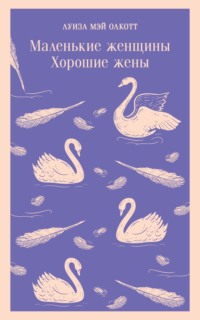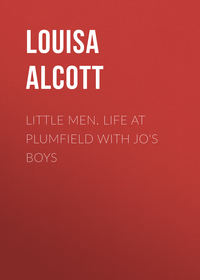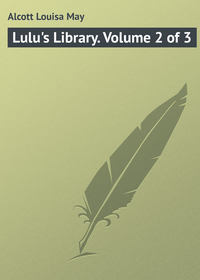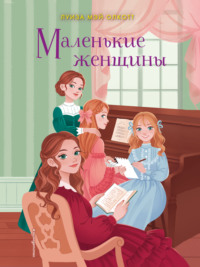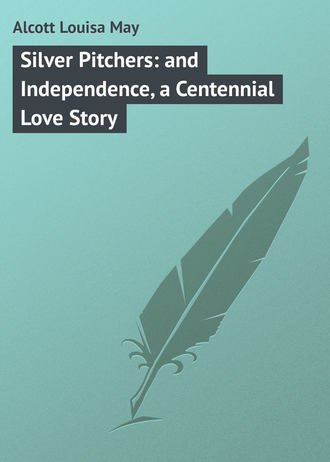 полная версия
полная версияSilver Pitchers: and Independence, a Centennial Love Story
"Over yonder." And Joel pointed to a little brown house on the hillside.
"Are his mother and Hetty there?"
"Hetty married a number of years ago; but the old lady is there."
"And you are visiting her?"
"I live with her. You see Tom was all she had; and, when Hetty left, it was only natural that I tried to take Tom's place. Can't never fill it of course; but I do what I can, and she's comfortable."
"So she is the 'old mother' who thinks so much of you? Well she may," said Rose, giving him her brightest smile.
"Yes, she's all I've got now. Couldn't do no less, could I, seein' how much Tom done for me?" answered the man, with a momentary quiver of emotion in his rough voice.
"You're a trump!" said Uncle Ben, emphatically.
"Thanky, sir. Starboard, if you please. I don't care to get into the rapids just here."
Joel seemed to dislike telling this part of the story; but the three listeners beamed upon him with such approving faces that he took to his oars in self-defence, rowing with all his might, till the roar of the Fall was faintly heard.
"Now, where shall I land you, sir?"
"Let us lunch on the island," proposed Rose.
"I see a tent, and fancy some one is camping there," said Milly.
"A lot of young fellows have been there this three days," said Joel.
"Then we will go on, and take to the grove above the Fall," ordered Uncle Ben.
Alas! alas! for Rose. That decision delayed her happiness a whole half day; for on that island, luxuriously reading "The Lotus Eaters," as he lay in the long grass, was the Gabriel this modern Evangeline was waiting for. She never dreamed he was so near. And the brown-bearded student never lifted up his head as the boat floated by, carrying the lady of his love.
"I want to give him more than his fare. So I shall slip my cigar-case into the pocket of this coat," whispered Uncle Ben, as Joel was busy drawing up the boat and getting a stone or two to facilitate the ladies' landing dryshod.
"I shall leave my book for him. He was poring over an old newspaper, as if hungry for reading. The dash and daring of 'John Brent' will charm him; and the sketch of Winthrop's life in the beginning will add to its value, I know." And, hastily scribbling his name in it, Rose slipped the book under the coat.
But Milly, seeing how old that coat was, guessed that Joel gave his earnings to the old woman to whom he dutifully played a son's part. Writing on a card "For Tom's mother and mate," she folded a five-dollar bill round it, fastened it with a little pearl cross from her own throat, and laid it in the book.
Then all landed, and, with a cordial hand-shake and many thanks, left Joel to row away, quite unconscious that he was a hero in the pretty girl's eyes, till he found the tokens of his passengers' regard and respect.
"Now that is an adventure after my own heart," said Rose, as they rustled along the grassy path toward the misty cloud that hung over the Fall.
"We have nothing but sandwiches and sherry for lunch, unless we find a house and add to our stores," said Uncle Ben, beginning to feel hungry and wondering how far his provisions would go.
"There is a little girl picking berries. Call her and buy some," suggested Milly, who had her doubts about the state of the sandwiches, as the knapsack had been sat upon.
A shout from Uncle Ben caused the little girl to approach, – timidly at first; but, being joined by a boy, her courage rose, and when the idea of a "trade" was impressed upon their minds fear was forgotten and the Yankee appeared.
"How much a quart?"
"Eight cents, sir."
"But that birch-bark thing is not full."
"Now it is," and the barefooted, tow-headed lad filled the girl's pannier from his own.
"Here's chivalry for you," said Rose, watching the children with interest; for the girl was pretty, and the boy evidently not her brother.
"You don't pick as fast as she does," said Milly, while Uncle Ben hunted up the money.
"He's done his stent, and was helpin' me. I'll have to pick a lot before I git my quarter," said the girl, defending her friend, in spite of her bashfulness.
"Must you each make a quarter?"
"Yes'm. We don't have to; but we wanter, so we can go to the circus that's comin' to-morrer. He made his'n ketchin' trout; so he's helpin' me," explained the girl.
"Where do you get your trout?" asked Uncle Ben, sniffing the air, as if he already smelt them cooking.
"In the brook. I ain't sold mine yet. Want to buy 'em? Six big ones for a quarter," said the boy, seeing hunger in the good man's eye and many greenbacks in the corpulent purse.
"Yes, if you'll clean them."
"But, Uncle, we can't cook them," began Milly.
"I can. Let an old campaigner alone for getting up a gipsy lunch. You wanted a surprise; so I'll give you one. Now, Billy, bring on your fish."
"My name is Daniel Webster Butterfield Brown," returned the boy, with dignity; adding, with a comical change of tone: "Them fish is cleaned, or you'd a got 'em cheaper."
"Very well. Hand them over."
Off ran the boy to the brook; and the girl was shyly following, when Rose said, —
"Will you sell me that pretty bark pannier of yours? I want one for my flowers."
"No'm. I guess I'd ruther not."
"I'll give you a quarter for it. Then you can go to the circus without working any more."
"Dan made this for me, real careful; and I couldn't sell it, no way. He wouldn't go without me. And I'll pick stiddy all day, and git my money. See if I don't!" answered the child, hugging her treasure close.
"Here's your romance in the bud," said Uncle Ben, trying not to laugh.
"It's beautiful!" said Rose, with energy. "What is your name, dear?"
"Gusty Medders, please'm."
"Dan isn't your brother?"
"No'm. He lives to the poor-house. But he's real smart, and we play together. And him and me is going to the show. He always takes care o' me; and my mother thinks a sight of him, and so do I," returned the child, in a burst of confidence.
"Happy little Gusty!" said Rose, to herself.
"Thrice happy Dan," added Uncle Ben, producing the fat pocket-book again, with the evident intention of bestowing a fortune on the small couple.
"Don't spoil the pretty little romance. Don't rob it of its self-sacrifice and simplicity. Let them earn their money. Then they will enjoy it more," cried Milly, holding his hand.
Uncle Ben submitted, and paid Dan his price, without adding a penny.
"The lady wanted to buy my basket. But I didn't sell it, Danny; 'cause you give it as a keepsake," they heard Gusty say, as the children turned away.
"Good for you, Gus; but I'll sell mine." And back came Dan, to dispose of his for the desired quarter. "Now we're fixed complete, and you needn't pick a darned berry. We've got fifty cents for the show, and eight, over for peanuts and candy. Won't we have a good time, though?"
With which joyful remark Dan turned a somersault, and then the little pair vanished in the wood, with shining faces, to revel in visions of the splendors to come.
"Now you have got your elephant, what are you going to do with him?" asked Rose, as they went on again, – she with her pretty basket of fruit, and he with a string of fish wrapped in leaves.
"Come on a bit, and you will see."
Uncle Ben led them to the shade of a great maple, on a green slope, in sight of the noisy Fall, leaping from rock to rock, till the stream went singing away through wide, green meadows below.
"Now rest and cool yourselves, while I cook the dinner." And away bustled the good man, on hospitable thoughts intent.
Plenty of dry drift-wood lay about the watercourse, and soon a brisk fire burned on the rocks not far away. Shingles for plates, with pointed sticks for forks, seemed quite in keeping with the rustic feast; and when the edibles were set forth on leaves the girls were charmed, and praised the trout, as it came hot from the coals, till even the flushed cook was satisfied.
"I'd like to live so always. It is so interesting to pick up your food as you go, and eat it when and where you like. I think I could be quite happy leading a wild life like this," said Rose, as she lay in the grass, dropping berries one by one into her mouth.
"You would soon tire of it, Miss Caprice; but, if it amuses for a single day, I am satisfied," answered Milly, with her motherly smile, as she stroked the bright head in her lap, feeling sure that happiness was in store for so much youth and beauty.
Lulled by the soft caress, and the song of the waterfall, Rose fell asleep, and for an hour dreamed blissfully, while the maple dropped its shadows on her placid face, and all the wholesome influences of the place worked their healing spell on soul and body.
"A thunder-shower is rolling up in the west, my dears. We must be getting toward some shelter, unless we are to take a drenching as part of the day's pleasure," said Uncle Ben, rising briskly after his own nap.
"I see no house anywhere; but a big barn down in the intervale, and a crowd of people getting in their hay. Let us make for that, and lie on the sweet haycocks till the shower comes," proposed Milly.
As they went down the steep path, Rose began to sing; and at the unwonted sound her uncle and friend exchanged glances of satisfaction, for not a note had she sung for weeks. A happy mood seemed to have taken possession of her; and when they reached the intervale she won the old farmer's heart by catching up a rake and working stoutly, till the first heavy drops began to fall. Then she rode up to the barn on a fragrant load, and was so charmed with the place that she declined his invitation to "Come up and see the old woman and set a spell," and declared that she depended on enjoying the thunder-storm where she was.
The farmer and his men went their way, and Rose was just settling herself at the upper window, where the hay had been pitched in, when a long line of gay red vans came rattling down the road, followed by carriages and gilded cars, elephants and camels, fine horses and frisky ponies, all more or less excited by the coming storm.
"It's the circus! How I wish Gusty and Dan could see it!" cried Rose, clapping her hands like a child. "I do believe they are coming here. Now that will be charming, and the best adventure of all," she added, as a carriage and several vans turned into the grassy road leading to the barn.
A pair of elephants slowly lumbered after, with a camel or two, and the finest gilded car. The rest rattled on, hoping to reach the town in time. In a moment the quiet country scene was changed, and the big barn transformed into a theatrical Babel.
Our party retreated to a loft, and sat looking down on the show, enjoying it heartily; especially Rose, who felt as if suddenly translated into an Eastern tale. The storm came on dark and wild, rain poured, thunder rolled, and lightning gave lurid glimpses of the strange surroundings.
The elephants placidly ate hay; the tired camels lay down with gusty sighs and queer groanings; but the lion in his lonely van roared royally at intervals, and the tigers snarled and tore about their cage like restless demons.
The great golden car lit up the gloom; and in it sat, or lay, the occupants of the carriage, – a big, dark man, and a little blonde creature, with a pretty, tired, painted face. Rose soon found herself curiously attracted to this pair, for they were evidently lovers; and there was a certain frank, melodramatic air about them that took her fancy. The dark man lay on the red cushion, smoking tranquilly; while the girl hovered about him with all manner of small attentions. Presently he seemed to drop asleep, undisturbed by the thunder without or the clamor within. Then the small creature smoothed her gay yet shabby dress, and braided up her hair, as composedly as if in her own room. That done, she looked about her for amusement; and, spying Rose's interested face peering down at her from above, she nodded, and called out, in a saucy voice, —
"How do you like us? Shall I come up and make you a visit?"
"I beg you will," answered Rose, in spite of a warning touch from Milly.
Up sprang the little circus-rider; and, disdaining the ladder, skipped to the gilded dome of the car, and then took a daring leap on to the loft, landing near them with a laugh.
For a minute she eyed the others with a curious mixture of coolness and hesitation, as if it suddenly struck her that they were not country girls, to be dazzled by her audacity. Milly saw and understood the pause, liked the girl for it, and said, as courteously as if to a lady in her own parlor, —
"There is plenty of room for us all. Pray sit down and enjoy this fine view with us. The storm is passing over now, and it will soon be fair."
"Thank you!" said the girl, dropping on to the hay, with her bold, bright eyes, full of admiration, fixed on Rose, who smiled, and said quickly, —
"You belong to the troop, I suppose?"
"First lady rider," replied the girl, with a toss of the head.
"It must be very romantic to lead such a life, and go driving from place to place in this way."
"It's a hard life, any way; and not much romance, you'd better believe."
"Not even for you." And Rose glanced at the sleeper below.
The girl smiled. Her bold eyes turned to him with a softened look, and the natural color deepened on her painted cheeks, as she said, in a lower voice, —
"Yes, Joe does make a difference for me. We've only been married three weeks."
"What does he do?"
"He's the lion-tamer." And the girl gave them a glance of wifely pride in her husband's prowess.
"Oh! tell me about it!" cried Rose. "I admire courage so much."
"You ought to see him do Daniel in the lion's den, then. Or his great tiger act, where he piles four of 'em up, and lays on top. It's just splendid!"
"But very dangerous! Does he never fear them? And do they never hurt him?"
"He don't fear any thing in the world," said the girl, entirely forgetting herself, in enthusiastic praise of her husband.
"Cæsar, the lion, loves him like a dog; and Joe trusts him as he does me. But them tigers are deceitful beasts, and can't be trusted a minute. Judas went at Joe once, and half killed him. He seems tame enough now; but I hate him, for they say that if a tiger once tastes a man's blood he's sure to kill him sooner or later. So I don't have a minute's peace when Joe is in that cage." And the little woman shivered with very genuine anxiety at the thought of her husband's danger.
"And, knowing this, he runs the risk every day! What a life!" said Uncle Ben, looking down at the unconscious Joe.
"A brave life, Uncle, and full of excitement. The minutes in that cage must be splendid. I wish I could see him once!" cried Rose, with the restless look in her eyes again.
"He'd do it, if he had his things here. He'll do any thing I ask him," said the girl, evidently proud of her power over the lion-tamer.
"We will come and see him to-morrow. Can't you tell us how he manages to subdue these wild animals? I always wanted to know about it," said Rose, wondering if she could not get some hints for the taming of men.
"Joe'll tell you." And, calling from her perch, the girl waked the sleeper and ordered him up to amuse the gentle-folk.
The big man came, with comical meekness; and, lounging on the hay, readily answered the questions showered upon him. Rose enjoyed that hour intensely; for the tales Joe told were full of wild adventure, hair-breadth escapes, and feats of strength or skill, that kept his listeners half breathless with interest. The presence of the little wife gave an added charm to these stories; for it was evident that the tamer of lions was completely subdued by the small woman. His brown, scarred face softened as it turned to her. While he talked, the strong hands that clutched lions by the throat were softly stroking the blonde head at his side; and, when he told of the fierce struggle with Judas, he grew so eloquent over the account of Kitty's nursing him that it was plain to see he was prouder of the conquest of her girl's heart than of his hard-won victory over the treacherous tiger.
The man's courage lent romance to his vulgar life, and his love ennobled his whole nature for a time. Kitty ate peanuts while he thrilled his hearers with his feats; but her face was so full of pride and affection all the while that no one minded what she did, and even Milly forgave the painted cheeks and cotton velvet dress for the sake of the womanly heart underneath.
The storm passed, the circus people bestirred themselves, and in a few minutes were on their way again. Joe and Kitty said "Good-by" as heartily as if that half-hour had made them friends; and, packing themselves into the little carriage drawn by the calico tandem, dashed away as gayly as if their queer honeymoon journey had just begun. Like parts of a stage pageant, the gilded car, the elephants and camels, frisky ponies, and gay red vans vanished along the winding road, leaving the old barn to silence and the scandalized swallows twittering among the rafters.
"I feel as if I'd been to an Arabian Night's entertainment," said Rose, as they descended and turned toward home.
"It was very interesting, and I do hope that brave Joe won't get eaten up by the tigers. What would poor Kitty do?" returned Milly, warmly.
"It would be sad and dreadful; but she would have the comfort of knowing how much he loved her. Some women don't even have that," added Rose, under her breath.
"A capital fellow and a nice little woman. We'll go and see them to-morrow; though I fancy I shall not like Mrs. Kitty half so well in gauze and spangles, jumping through hoops and over banners on horseback, as I did on the hayloft. And I shall be desperately anxious till Joe is safely out of the tiger's cage," said Uncle Ben, who had been as interested as a boy in the wild tales told them.
For an hour they walked back along the river-side, enjoying the wood odors brought out by the shower, the glories of the sunset sky, and the lovely rainbow that arched overhead, – a bow of promise to those who seemed passing under it from the old life to a new one, full of tender promise.
"I see a nice old woman in that kitchen, and I want to stop and ask for some new milk. Perhaps she will give us our supper, and then we can go on by moonlight," said Rose, as they came to a weather-beaten farm-house, standing under an ancient elm, with its door hospitably open, and a grandmotherly figure going to and fro within.
Rose's request was most graciously received, for the old woman seemed to regard them as most welcome cheerers of her solitude, and bustled about with an infectious cordiality that set them at their ease directly.
"Do tell! Caught in the shower? It come so suddin', I mistrusted some folks would get a duckin'. You kin hev supper jest as wal as not. 'Tain't a mite o' trouble, ef you don't mind plain vittles. Enos and me lives alone, and he ain't no gret of an eater; but I allers catle'ate to hev a good store of pervision on hand this time a year, there's such a sight of strangers round the mountains. The table's all set; and I'll jest add a pinch of tea and a couple of pies, and there we be. Now draw right up, and do the best you kin."
The cheery old soul was so hospitable that her presence gave a grace to her homely table and added flavor to her plain fare. Uncle Ben's eyes twinkled when he saw dainty Rose eating brown-bread and milk out of a yellow bowl, with the appetite of a dairymaid; and Milly rejoiced over the happy face opposite; wishing that it might always wear that self-forgetful look.
Enos was a feeble, bed-ridden, old man, who lay in a small room opening from the kitchen. A fretful invalid he seemed to be, hard to suit and much given to complaint. But the tender old wife never lost patience with him; and it was beautiful to see how cheerfully she trotted to and fro, trying to gratify every whim, without a reproachful word or thought of weariness.
After tea, as Rose wanted to wait till moonrise, Uncle Ben went in to chat with the invalid, while Milly insisted on wiping the cups for the old lady; and Rose sat on the doorstep, listening to their chat, and watching twilight steal softly up the valley. Presently her attention was fixed by something the old lady said in answer to Milly's praises of the quaint kitchen.
"Yes, dear, I've lived here all my days. Was born in that bed-room; and don't ask no better than to die there when my time comes."
"Most people are not fortunate enough to keep their old home when they marry. It must be very dear to you, having spent both your maiden and married life here," said Milly, interested in her hostess.
"Wal, you see my maiden life lasted sixty year; and my married life ain't but jest begun," answered the old lady, with a laugh as gay as a girl's.
Seeing curiosity in the quick glance Rose involuntarily gave her, the chatty old soul went on, as if gossip was dear to her heart, and her late-coming happiness still so new that she loved to tell it.
"I s'pose that sounds sing'lar to you young things; but, you see, though me and Enos was engaged at twenty or so, we warn't married till two year ago. Things was dreadful con'try, and we kep a waitin' and a waitin', till I declare for't I really did think I should die an old maid." And she laughed again, as if her escape was the best joke in the world.
"And you waited forty years?" cried Rose, with her great eyes full of wonder.
"Yes, dear. I had other chances; but somehow they didn't none of them suit, and the more unfort'nate Enos was the more I kinder held on to him. He was one of them that's allers tryin' new things, and didn't never seem to make a fortin out of any on 'em. He kept a tryin' because he had nothin', and would'nt marry till he was wal off. My mother was dead, and left a family to be took care on. I was the oldest gal, and so I nat'rally kept house for father till he died, and the children grew up and married off. So I warn't idle all them years, and got on first-rate, allers hopin' Enos's luck would turn. But it didn't (them cups goes in the right-hand corner, dear); and so I waited and waited, and hoped and hoped."
"Oh! how could you?" sighed Rose, from the soft gloom of the doorway.
"'Pears to me strength is give us most wonderful to bear trials, if we take 'em meek. I used to think I couldn't bear it no way when I was left here alone, while Enos was in Californy; and I didn't know for seven year whether he was dead or alive. His folks give him up; but I never did, and kept on hopin' and prayin' for him till he come back."
"How happy you were then!" cried Rose, as if she could sympathize heartily with that joy.
"No, I warn't, dear. That was the hardest part on't; for Enos was married to a poor, shiftless thing, that was a burden to him for ten year."
"That was hard," and Rose gave a groan, as if a new trouble had suddenly come upon her.
"I done my best for 'em, in their ups and downs, till they went West. Then I settled down to end my days here alone. My folks was all dead or fur away, and it was uncommon lonesome. But I kinder clung to the old place, and had it borne in upon me strong that Enos would turn up agin in time. I wanted him to find me here, ready to give him a helpin' hand whenever and however he come."
"And he did, at last?" asked Rose, with a sympathetic quiver in her voice that went to the old woman's heart.
"Yes, my deary; he did come at last," she said, in a voice full of a satisfaction that was almost solemn in its intensity. "Ruther mor'n two years ago he knocked at that door, a poor, broken-down old man, without wife, or child, or money, or home, – nothin' in the wide world but me. He didn't think I'd take him in, he was so mis'able. But, Lord love him, what else had I been a waitin' for them forty year? It warn't the Enos that I loved fust; but that didn't matter one mite. And when he sat sobbin' in that chair, and sayin' he had no friend but me, why I just answered back: 'My home is your'n, Enos; and I give it jest as hearty as I did when you fust pupposed, under the laylock bushes, in the back gardin. Rest here, my poor dear, and let Becky take care on you till she dies.'"
"So he stayed?" said Milly, with tears in her voice, for Rose's head was down on her knees, so eloquent had been the pathos of that old voice, telling its little tale of faithful love.



